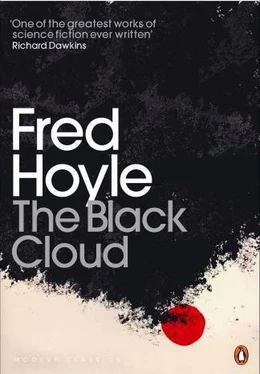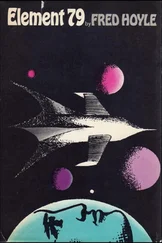Fred Hoyle - The Black Cloud
Здесь есть возможность читать онлайн «Fred Hoyle - The Black Cloud» весь текст электронной книги совершенно бесплатно (целиком полную версию без сокращений). В некоторых случаях можно слушать аудио, скачать через торрент в формате fb2 и присутствует краткое содержание. Жанр: Фантастика и фэнтези, на английском языке. Описание произведения, (предисловие) а так же отзывы посетителей доступны на портале библиотеки ЛибКат.
- Название:The Black Cloud
- Автор:
- Жанр:
- Год:неизвестен
- ISBN:нет данных
- Рейтинг книги:5 / 5. Голосов: 1
-
Избранное:Добавить в избранное
- Отзывы:
-
Ваша оценка:
- 100
- 1
- 2
- 3
- 4
- 5
The Black Cloud: краткое содержание, описание и аннотация
Предлагаем к чтению аннотацию, описание, краткое содержание или предисловие (зависит от того, что написал сам автор книги «The Black Cloud»). Если вы не нашли необходимую информацию о книге — напишите в комментариях, мы постараемся отыскать её.
The Black Cloud — читать онлайн бесплатно полную книгу (весь текст) целиком
Ниже представлен текст книги, разбитый по страницам. Система сохранения места последней прочитанной страницы, позволяет с удобством читать онлайн бесплатно книгу «The Black Cloud», без необходимости каждый раз заново искать на чём Вы остановились. Поставьте закладку, и сможете в любой момент перейти на страницу, на которой закончили чтение.
Интервал:
Закладка:
“What I imagine Alexis means,” Kingsley remarked, “is that there is no certainty that the present pattern of ocean currents will be maintained. If it isn’t, the effects might be completely disastrous. And this might happen quite quickly, quicker than an Ice Age.”
“You said it,” nodded Alexandrov. “Gulf Stream go, gets bloody cold.”
The Prime Minister felt he had heard enough.
During November the pulse of mankind quickened. And as Governments got matters more and more in hand the desire for communication between the various pockets of humanity strengthened. Telephone lines and cables were repaired. But it was to radio that men turned in the main. Long wave radio transmitters were soon working normally, but of course they were useless for long distance communication. For this, short wave transmitters were put into operation. But the short wave transmitters failed to work, and for a reason that was soon discovered. The ionization of the atmospheric gases at a height of about fifty miles turned out to be abnormally high. This was giving rise to an excessive amount of collisional damping, as the radio engineers called it. The excessive ionization was caused by the radiation from the very hot upper reaches that were still producing the blue shimmering nights. In short, radio fade-out conditions were operative.
There was only one thing to be done: to shorten the transmitting wave-length. This was tried down to a wave-length of about one metre, but still the fade-out continued; and no suitable transmitters on still lower wave-lengths were available, since lower wave-lengths were never widely used before the coming of the Cloud. Then it was remembered that Nortonstowe possessed transmitters that would work from one metre down as far as one centimetre. Moreover the Nortonstowe transmitters were capable of handling an enormous quantity of information, as Kingsley was not slow to point out. It was accordingly decided to make Nortonstowe a world information clearing-house. Kingsley’s plan had borne fruit at last.
Intricate calculations had to be performed and, as they had to be done quickly, the electronic computer was put into operation. The problem was to find the best wave-length. If the wave-length was too long the fade-out trouble would continue. If the wave-length was too short the radio waves would stream out of the atmosphere away into space instead of being bent round the Earth, as they must be to travel from London to Australia, let us say. The problem was to compromise between these extremes. Eventually a wave-length of twenty-five centimetres was decided on. This was thought to be short enough to overcome the worst of the fade-out difficulty, and yet not to be so short that too much power would get squirted out into space, although it was recognized that some loss must occur.
The Nortonstowe transmitters were switched on during the first week of December. Their information-carrying capacity turned out to be prodigious, as Kingsley had predicted. Less than half an hour on the first day was sufficient to clear the whole backlog of information. To begin with, only a few Governments possessed a transmitter and receiver, but the system worked so well that soon many other Governments were lashing up equipment at all speed. Partly for this reason the volume of traffic through Nortonstowe was quite small at first. Also it was difficult to appreciate initially that an hour’s talk occupied a transmission time of a small fraction of a second. But as time went on, conversation and messages became longer, and more Governments joined in. So transmission at Nortonstowe rose gradually from a few minutes a day to an hour or more.
One afternoon, Leicester, who had organized the building of the transmission system, rang Kingsley and asked him to come along to the transmitting lab.
“What’s the panic, Harry?’ asked Kingsley.
“We’ve done a fade!”
“What!”
“Yes, right out. You can see it over here. A message was coming through from Brazil. Look how the signal has gone completely.”
“It’s fantastic. Must be an extremely rapid burst of ionization.”
“What d’you think we ought to do?”
“Wait, I suppose. It may be a transient effect. In fact it looks rather like it.”
“If it goes on we might shorten the wave-length.”
“Yes, we might. But scarcely anybody else could. The Americans could work up a new wave-length pretty quickly, and probably the Russians as well. But it’s doubtful if many of the others could. We’ve had enough trouble getting ’em to build their present transmitters.”
“Then there’s nothing to do but hang on?”
“Well, I don’t think I should try transmitting, because you’ll never know if the messages get through. I should just leave the receiver on recorder. Then we shall have any stuff that happens to come through — if conditions improve, that is to say.”
There was a brilliant aurora-type display that night, which the Nortonstowe scientists took to be associated with the sudden burst of ionization high in the atmosphere. They had no idea of the cause of the ionization, however. Very large disturbances of the Earth’s magnetic field were also noted.
Marlowe and Bill Barnett discussed the matter as they strolled around, admiring the display.
“My God, look at those orange-coloured sheets,” said Marlowe.
“What baffles me, Geoff, is that this is obviously a low-level display. You can tell that from the colours. I suppose we ought to have a shot at getting a spectrum, although I’d swear to it from what we can see right now. I’d say that all this is going on not more than fifty miles up, probably less. It’s in just the place where we’ve been getting all the excessive ionization.”
“I know what you’re thinking, Bill. That it’s easy to imagine a sudden puff of gas hitting the extreme outside of the atmosphere. But that would produce a disturbance much higher up. It’s difficult to believe this is due to impact.”
“No, I don’t think it possibly can be. It looks to me much more like an electrical discharge.”
“The magnetic disturbances would check with that.”
“But you see what this means, Geoff? This isn’t from the Sun. Nothing like it from the Sun has ever happened before. If it’s an electrical disturbance, it must come from the Cloud.”
Leicester and Kingsley hurried along to the communication lab after breakfast the following morning. A short message from Ireland had come in at 6.20. A long message from the U.S. had started at 7.51, but after three minutes there had been a fade and the rest of the message was lost. A short message from Sweden was received about midday, but a longer message from China was interrupted by fade-out soon after two o’clock.
Parkinson joined Leicester and Kingsley at tea.
“This is a most disturbing business,” he said.
“I can imagine so,” answered Kingsley. “And it’s another queer business.”
“Well, it’s certainly annoying. I thought we’d got this communication problem in hand. In what way is it queer?”
“In that we seem to be on the verge of transmission the whole time. Sometimes messages come through and sometimes they don’t, as if the ionization is oscillating up and down.”
“Barnett thinks that electrical discharges are going on, So wouldn’t you expect oscillations?”
“You’re becoming quite a scientist, aren’t you, Parkinson?’ laughed Kingsley. “But it isn’t as easy as that,” he went on. “Oscillation yes, but hardly oscillations like the ones we’ve been getting. Don’t you see how odd it is?”
“No, I can’t say I do.”
“The messages from China and the U.S., man! We got a fade-out on each of ’em. That seems to show that when transmission is possible it’s only barely possible. The oscillations seem to be making transmission just possible but only by the slightest margin. That might happen once by chance but it’s very remarkable that it should happen twice.”
Читать дальшеИнтервал:
Закладка:
Похожие книги на «The Black Cloud»
Представляем Вашему вниманию похожие книги на «The Black Cloud» списком для выбора. Мы отобрали схожую по названию и смыслу литературу в надежде предоставить читателям больше вариантов отыскать новые, интересные, ещё непрочитанные произведения.
Обсуждение, отзывы о книге «The Black Cloud» и просто собственные мнения читателей. Оставьте ваши комментарии, напишите, что Вы думаете о произведении, его смысле или главных героях. Укажите что конкретно понравилось, а что нет, и почему Вы так считаете.












